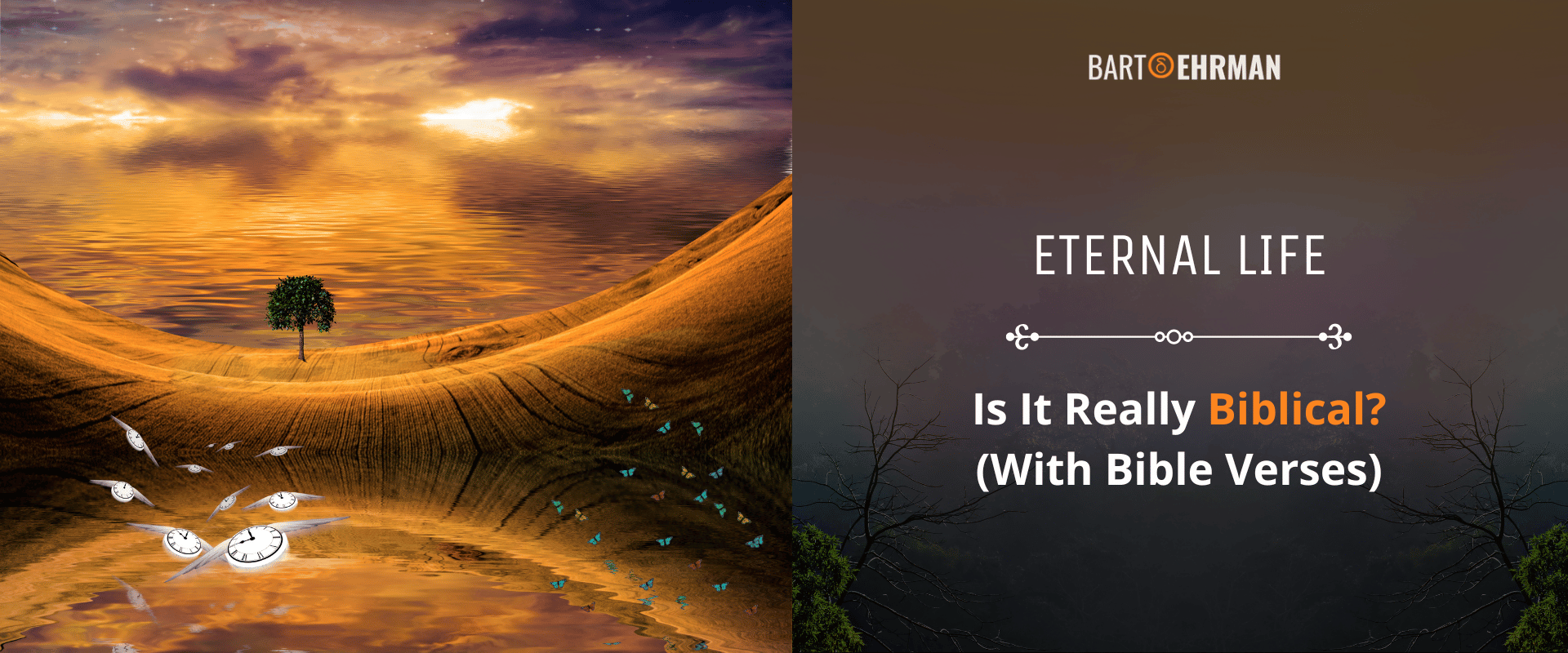Eternal Life: Is It Really Biblical? (With Bible Verses)

Written by Marko Marina, Ph.D.
Author | Historian
Author | Historian | BE Contributor
Verified! See our guidelines
Verified! See our editorial guidelines
Date written: August 5th, 2024
Edited by Laura Robinson, Ph.D.
Disclaimer: The views and opinions expressed in this article belong to the author and do not necessarily match my own. - Dr. Bart D. Ehrman
According to the Pew Research Center survey from 2021, more than 90% of Evangelical Christians in the USA believe in the afterlife. Similar numbers are found among American Catholics. The belief in eternal life after death is a cornerstone of Christian doctrine, deeply influencing how millions of believers live. But what does the Bible actually say about the subject?
This article will explore whether the Bible, from a scholarly and historical perspective, supports the concept of eternal life.
It’s important to note that our focus here will be on the bible verses about heaven and eternal life themselves, not the truth of eternal life. We'll start by defining what eternal life means within the Christian religion. Then, we’ll delve into the New Testament, especially the Gospels, to see if there are traces of this belief.
We’ll also examine the teachings of the historical Jesus and the first Christians. Next, we will look into the Old Testament to see if the concept is present there and what Jewish beliefs about the afterlife were. Finally, we’ll conclude with a scholarly assessment of our findings.
By understanding the biblical basis for eternal life, we can better understand how this doctrine developed and its significance in Christian history.
This study will not only shed light on the biblical basis for eternal life but provide insight into how these ancient texts continue to influence modern beliefs and practices.

What Is Eternal Life in Christian Tradition?
While virtually all Christians believe in the resurrection and eternal life, there is significant disagreement over what happens to the deceased between their deaths and the resurrection, which is expected to occur at the end of the world.
St. Augustine, for instance, believed that the dead sleep in some way and then awaken during the resurrection. This belief underscores the variety of interpretations within Christianity regarding the interim state of the soul.
In his book Death and Eternal Life, theologian John Hick points out that in two literary texts that best capture and shape the Christian vision of the afterlife — Dante’s Divine Comedy and Milton’s Paradise Lost — the emphasis is on the journey of the soul after death, not on the resurrected body. (Affiliate Disclaimer: We may earn commissions on products you purchase through this page at no additional cost to you. Thank you for supporting our site!)
In the United States and Europe, this view has largely prevailed. So, where does the soul go after death according to mainstream Christian belief?
Most Christians assert that souls go either to heaven or hell. Throughout Christianity’s history, theologians and authorities have emphasized the afterlife, particularly the horrors of hell. Many preachers and missionaries have centered their theology on the fear of hell and the threat of God’s anger.
This approach was prevalent among the earliest Christian missionaries as well. Ramsay MacMullen, referring to the Coptic Apocalypse of Peter, which vividly describes the tortures of the damned, noted: “It is the only sadistic literature I am aware of in the ancient world.”
Heaven, on the other hand, has been described in various ways over time. The primary theme in most accounts is that human beings exist in the glorious, loving presence of God. The Catechism of the Catholic Church explains it thus: “Those who die in God's grace and friendship and are perfectly purified live forever with Christ. They are like God forever, for they see him as he is, face to face.”
As you can imagine, the question “What must I do to inherit eternal life?” has been central to Christian teachings and doctrine. For many, eternal life isn’t merely an endless existence but a profound, intimate relationship with God. It represents the culmination of a faithful Christian life, where believers are rewarded with perpetual happiness and divine presence.
But where does the idea of eternal life derive from? Are there any Biblical verses about heaven and hell? To answer these questions, we must first delve into the New Testament and explore what it reveals about these concepts.
The Historical Jesus and Eternal Life
Since the 18th century, scholars have recognized that the New Testament Gospels present challenges as historical sources for reconstructing what the historical Jesus said and did.
Written between 35 to 65 years after the events they describe, their authors weren’t eyewitnesses. Instead, they relied primarily on oral traditions that had circulated for decades, traditions that were often altered — sometimes slightly, sometimes significantly — during transmission.
Given this context, what can we infer about the historical Jesus and his beliefs regarding heaven and hell?
If we peel back the layers of myth and tradition, it appears that the historical Jesus didn’t preach the soul's journey to heaven or hell as many might expect. As an apocalyptic Jew, Jesus proclaimed the imminent coming of God’s kingdom, the Judgment Day, and the bodily resurrection.
In this judgment, those who rejected God would be punished, and those who stood by him would enter an everlasting Kingdom. Importantly, this Kingdom was envisioned as a real entity on Earth, not a celestial afterlife. Therefore, Jesus' teachings focused on the imminent establishment of God's Kingdom on Earth rather than the soul's journey after death.
Regarding the concept of hell, scholarly opinions diverge. Bart D. Ehrman, in his book Heaven and Hell, argues that Jesus didn’t envision the everlasting torment for sinners after death. Instead, he believed that death was irreversible for the wicked — their punishment being annihilation, ceasing to exist, while the saved would enjoy eternal life in God's glorious kingdom that would be established on Earth.
Conversely, scholars like Dale C. Allison suggest Jesus might have held some belief in a doctrine of hell. In Resurrecting Jesus, Allison posits that Jesus could have believed in a temporary period of suffering for sinners, followed by eventual annihilation, aligning somewhat with the later rabbinic teachings.
To summarize, while interpretations vary, Jesus' teachings on eternal life were deeply rooted in apocalyptic expectations. He focused on the promise of a resurrected life in a divinely renewed earthly kingdom rather than an immediate afterlife in heaven or hell.
However, after his death, and based on a profound religious experience of his resurrection, the first Christians reinterpreted and expanded upon his teachings which can be observed in the New Testament Gospels. There, we find traces of the clear belief in eternal life in the form of the soul’s journey to either heaven or hell.
Eternal Life in the Early Christian Tradition: The NT Gospel and Paul
Having dealt briefly with the views of the historical Jesus, we’ll now look at the beliefs of the early Christians by examining the Gospels of the New Testament and the teachings of Paul. Did evangelists and Paul believe in eternal life? Let’s start with the Synoptic Gospels.
The Synoptic Gospels and Eternal Life
The Synoptic Gospels each present distinct perspectives on the concept of eternal life, reflecting the theological and communal concerns of their authors. In these texts, the theme of “eternal life” often appears in the context of Jesus' teachings about the Kingdom of God.
For instance, in the Gospel of Mark, a rich man asks Jesus: “What must I do to inherit eternal life?” (Mark 10:17). Jesus responds by emphasizing the necessity of following the commandments and, crucially, giving up material wealth to follow Him.
Commenting on this passage, Joel Marcus notes: “The ultimate answer, then, to the question, ‘What shall I do to inherit eternal life?’ is ‘Take up your cross, and follow me’ (cf. 8:34). This call to follow is not simply an invitation to self-denial, since Jesus forthrightly promises the man “treasure in heaven” if he will embrace it.”
This interaction also underscores a recurring theme in the Synoptics: eternal life is closely tied to ethical behavior and allegiance to Jesus' teachings.
Matthew’s Gospel, written for a predominantly Jewish-Christian audience, also underscores ethical conduct as a pathway to eternal life. In the famous Sermon on the Mount, Jesus teaches about the blessings of the Kingdom of Heaven for the righteous (Mt 5-7). Matthew 25:31-46 also depicts the judgment of the "sheep and the goats," in which the nations who fed, clothed, and visited Jesus in the forms of "the least of his" brothers and sisters are rewarded with eternal life. Those who did not go to "eternal destruction."
Luke’s Gospel, with its emphasis on social justice and compassion, similarly portrays eternal life as a reward for those who embody the values of the Kingdom of God. In the parable of the Good Samaritan (Luke 10:25-37), Jesus illustrates that inheriting it involves loving one's neighbor and showing mercy, regardless of social or ethnic boundaries.
Furthermore, as Jan Bremmer notes in The Rise and Fall of the Afterlife, Luke is the only one to relate the parable of the rich man, who after death stays 'in Hades', and poor Lazarus, who ‘was carried by the angels into Abraham’s bosom’ (16: 19–31). He is also the only one to mention Jesus’ words to the robber on the cross: ‘Truly I say to you, today you will be with me in Paradise’ (23: 43).
In summary, the Synoptic Gospels collectively portray eternal life as an integral aspect of the Kingdom of God, accessible through righteous living, ethical behavior, and wholehearted commitment to Jesus' teachings.
The Gospel of John and Eternal Life
The Gospel of John is significantly different from the Synoptic Gospels in terms of theology, particularly regarding the concept of eternal life. While the Synoptics focus on ethical behavior and adherence to Jesus' teachings as pathways to it, John emphasizes belief in Jesus himself as the key to eternal life above (in heaven).
In other words, being written c. 60 years after Jesus’ death, John’s Gospel “de-apocalypticized” Jesus’ message. Bart D. Ehrman explains: “In John, Jesus no longer speaks of the coming intervention of God to bring in his glorious kingdom. Instead, he principally talks about heaven above and how people can go there by believing in him.”
Heaven and Hell: Real Places or States of the Soul?
The concept of eternal life often sparks a fascinating debate about the language of Scripture: is it literal or metaphorical? Are heaven and hell actual places where souls reside forever after death, or do they symbolically represent states of the soul?
This intriguing discussion took a prominent stage in 1999 when Pope John Paul II described heaven and hell not as physical locations but as states of the soul. According to the Pope, heaven is a state of perfect communion with God, while hell is the state of being alienated from him. However, this perspective was not universally accepted. Some conservative Protestant theologians argued that heaven and hell are, indeed, real places. They contended that, without the belief in tangible rewards and punishments, people might lose the moral incentive to live righteously.
Furthermore, in the Gospel of John, followers of Jesus and those who reject him don’t need to wait for an eschatological Day of Judgment or the resurrection of the dead to experience divine blessings or curses.
Nor are they rewarded or punished solely at the moment of their deaths. Rather, this Gospel asserts that anyone who believes in Jesus already experiences the joys of eternity in the present.
Probably the most famous verse concerning eternal life in John is found in the story of raising Lazarus (John 11) where Jesus explains to Lazarus’ sister: “I am the resurrection and the life. The one who believes in me will live, even if he dies; and everyone who lives and believes in me will never die.”
No other person has done so much in the spread of the nascent Christian movement as the apostle Paul. Did he believe in eternal life? Let’s take a look!
Apostle Paul and Eternal Life
Paul's letters are our oldest Christian sources, with 1 Thessalonians written as early as the middle of the 1st century C.E. As such, they provide invaluable insights into the early Christian understanding of eternal life.
To begin with, Paul’s views were deeply shaped by his experience on the road to Damascus. He concluded that Jesus' resurrection is a sign of God's deeper plan and, through the belief in Jesus’ redemptive death and resurrection, one can gain salvation.
Needless to say, that is quite different from what the historical Jesus preached. One can only imagine what would Jesus say to Paul if he heard what the apostle preached to the Gentiles. These two pivotal figures for the emergence and the development of Christianity had also different views on eternal life.
Paul's epistles, though not always explicit, reveal his beliefs about what happens after death, emphasizing both an immediate post-mortem experience and a future resurrection.
In Philippians 1:22-23, Paul suggests a belief in an immediate union with Christ upon death. He expresses a personal conflict between the desire to continue his earthly ministry and the desire to “depart and be with Christ,” indicating that he expects to be in Christ's presence immediately after his death.
Similarly, in 2 Corinthians (5:1-10), Paul speaks of a heavenly dwelling and expresses confidence that being “away from the body” means being “at home with the Lord.” These passages imply that he believed in a direct transition to being with Christ after death, even before the final resurrection.
Moreover, Paul also discusses the future resurrection of the dead, which he envisions as a transformative event at the end of time that would happen soon. In 1 Thessalonians 4:16-17, Paul describes the dead in Christ rising first at the second coming, followed by the living who will be caught up together with them to meet the Lord.
This dual aspect of Paul's eschatology — immediate post-mortem presence with Christ and a future resurrection — illustrates a complex and multifaceted view of the afterlife within early Christian thought.
It’s possible, though far from certain, that Paul developed his belief in the interim state due to the delay of parousia — Jesus’ second coming — (a thesis that Charles H. Dodd first proposed) However, as Dale Allison pointed out to me in a correspondence, one can believe in an interim state and still hold to a near expectation of Jesus’ second coming.
Regardless of the possible explanations, the dual aspect of Paul’s eschatology remains a fact. Perhaps future studies or the discovery of a new source will shed some light on this captivating topic!

Eternal Life in the Old Testament: A Brief Look at the Jewish Tradition
In 1970s America, only 19% of American Jews of American Jews believed in an afterlife. Today, that percentage has risen to around 40%. This shift prompts an exploration into the Jewish Sacred Scripture, known as the Old Testament or the Hebrew Bible, to see if there are any traces of belief in eternal life.
The Old Testament recounts the covenant established between God and the people of Israel. In this covenant, God doesn’t promise eternal life. Instead, He promises that if the people follow His commandments, they will be granted descendants, their tribe will flourish, and they will be given the land of Israel, with Jerusalem as its sacred center.
In the Old Testament, the place people go after death is called Sheol. Contrary to common misconceptions, Sheol is not depicted as an underworld place where people "live" forever.
As Bart D. Ehrman explains in Heaven and Hell:
Probably most people who read the Bible think of Sheol as a Jewish kind of Hades, a shadowy place where everyone goes and all are treated the same, a banal and uninteresting netherworld where nothing really happens and people are, in effect, bored for all eternity. But in fact, in most passages of the Bible where Sheol is mentioned, it may well simply be an alternative technical term for the place where an individual is buried — that is, their grave or a pit.
So, in the oldest Israelite ideas, Sheol was closely related to the grave. “To go down into grave” (Psalm 16:10) was equivalent to “go down into Sheol” (Genesis 37:35). It was a place filled with worms (Isaiah 26:19) and impossible to escape from (Job 7:9).
However, during the period of Second Temple Judaism (late 6th century B.C.E - 1st century C.E.), the idea of eternal life began to emerge (likely due to the Hellenization).
Starting in the 3rd century B.C.E., the Jewish notion of a world to come became linked with the idea of bodily resurrection after death. This period saw a significant shift in Jewish eschatological thought, where the righteous would be resurrected to dwell eternally in God's righteous kingdom on earth.
The belief in resurrection became more widespread in the 2nd century B.C.E., with the Book of Daniel serving as a prime example. Written during a time when Jews were suffering under the oppressive rule of the Hellenistic Seleucid Empire and facing enforced practices of polytheistic religion, the notion of a “world to come” provided solace and hope.
Furthermore, another important shift took place around the same time. Jan Bremmer notes that in the 2nd century B.C.E. Sheol started to be complemented by Gehenna. He explains:
This valley south of Jerusalem, where tradition located the sacrifice of children to Moloch during the time of the kings now first became thought of as the place where punishments would be dealt out after the Last Judgment, but soon became the name for the fiery hell destined for the impious straight after their death and after the Last Judgment.
This marks a distinct departure from earlier Old Testament texts, indicating an evolving belief in life after death. The promise of resurrection and eternal life undoubtedly offered comfort to those enduring persecution and reinforced the hope for divine justice and restoration in the world to come.
Having explored both the Old and the New Testament, we find ourselves wondering where and how the Christian idea of eternal life emerged. To that, we turn our attention now!
The Origin of the Christian Belief in Eternal Life
The concept of eternal life in the Christian tradition didn’t originate with the historical Jesus. As discussed earlier, Jesus didn’t preach about eternal life in heaven or hell. Instead, he focused on the imminent establishment of God's Kingdom on Earth and the bodily resurrection of the dead.
Similarly, the earlier parts of the Old Testament don’t contain any notion of eternal life in the company of God in heaven (eternal reward) or hell (eternal torment).
The origins of the Christian belief in heaven and hell are complex and influenced by two primary factors. The first is the Hellenization of Palestinian Judaism, which began as early as the 3rd century B.C.E., as Martin Hengel demonstrated in his influential study Judaism and Hellenism.
This cultural and intellectual exchange introduced Jewish thought to Greek ideas, including the notion of the soul's immortality and an afterlife involving reward or punishment.
The second factor is the early Christian movement's rapid expansion among Greco-Roman converts. By the beginning of the 2nd century, the majority of Christian converts came from pagan backgrounds. These new believers were influenced by Greco-Roman culture, which included Platonic ideas of the separation of the soul and body and the belief in an eternal afterlife.
Thus, the emergence of eternal life in the Christian tradition is a synthesis of Jewish apocalyptic expectations and Greco-Roman philosophical concepts. This integration led to the development of the distinctive Christian doctrines of heaven and hell, which, of course, presuppose eternal life.
Before we wrap up this fascinating dive into one of Christianity's key beliefs, we thought we'd throw in a handy table of biblical verses. These passages either hint at eternal life or were enthusiastically (mis)interpreted by early Christians. Consider it a biblical cheat sheet with a twist!
Book | Verse | Text (NIV translation) |
|---|---|---|
Isaiah | 26:19 | “But your dead will live, Lord; their bodies will rise – let those who dwell in the dust wake up and shout for joy – your dew is like the dew of the morning; the earth will give birth to her dead.” |
Ezekiel | 37:13 | “Then you, my people, will know that I am the Lord when I open your graves and bring you up from them. I will put my Spirit in you and you will live, and I will settle you in your own land.” |
Daniel | 12:2 | “Multitudes who sleep in the dust of the earth will awake some to everlasting life, others to shame and everlasting contempt.” |
John | 3:16 | “For God so loved the world that he gave his one and only Son, that whoever believes in him shall not perish but have eternal life.” |
John | 5:24 | “Very truly I tell you, whoever hears my word and believes him who sent me has eternal life and will not be judged but has crossed over from death to life.” |
Romans | 6:23 | “For the wages of sin is death, but the gift of God is eternal life in Christ Jesus our Lord.” |
Titus | 1:2 | “In the hope of eternal life, which God, who does not lie, promised before the beginning of time…” |
Conclusion
In exploring the concept of eternal life within the Bible, we observe a complex and evolving belief system that has been shaped by historical contexts, cultural exchanges, and theological developments.
Through our examination of biblical verses about heaven and eternal life, we see that this concept evolved from Jewish apocalyptic expectations and Greco-Roman philosophical influences.
Moreover, this evolution led to the formation of the Christian beliefs in heaven and hell, which have become central to Christian eschatology.
Understanding these origins helps illuminate how early Christians interpreted and expanded upon the teachings of Jesus and the Hebrew Bible, integrating diverse ideas to form a coherent vision of the afterlife. This doctrine has profoundly influenced Christian thought and continues to shape the beliefs and practices of millions of believers worldwide.
If you're fascinated by the historical and mythical narratives of the Bible, join Dr. Bart D. Ehrman in his online course “In the Beginning: History, Legend, and Myth in Genesis.”
Discover whether history and archaeology corroborate the most important events recorded in Genesis, such as Noah's flood and Adam and Eve in the Garden of Eden. Sign up now to delve deeper into the captivating intersection of faith, history, and myth!
FREE COURSE!
WHY I AM NOT A CHRISTIAN
Raw, honest, and enlightening. Bart's story of why he deconverted from the Christian faith.
Over 6,000 enrolled!

